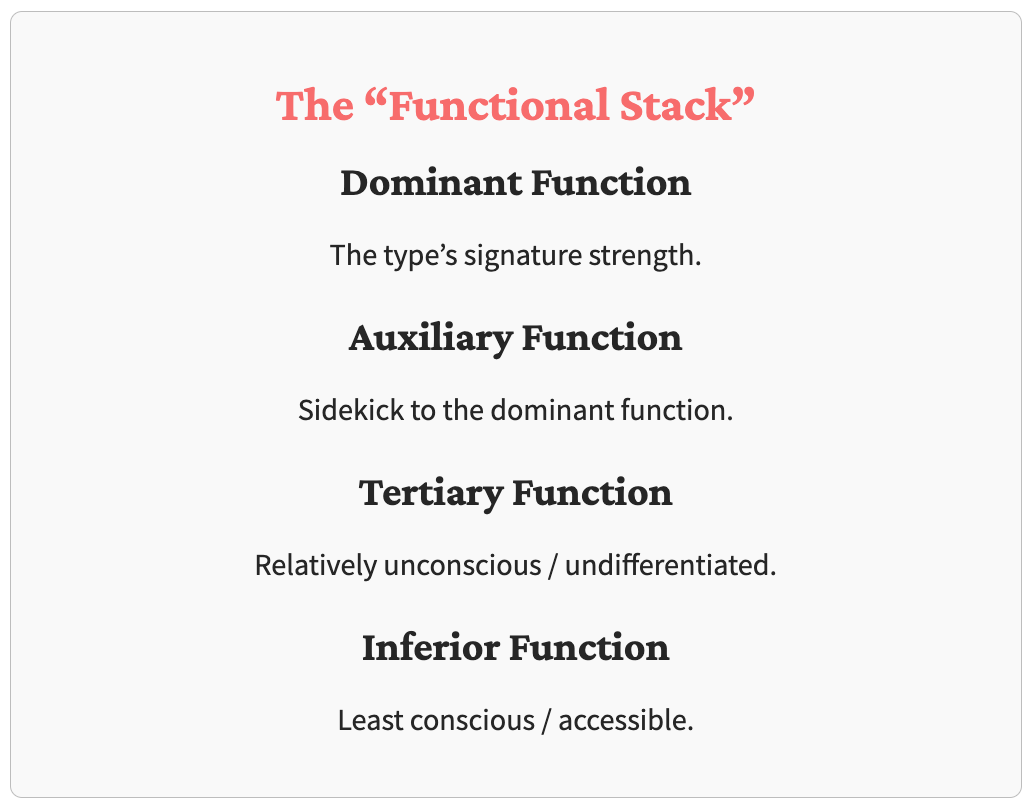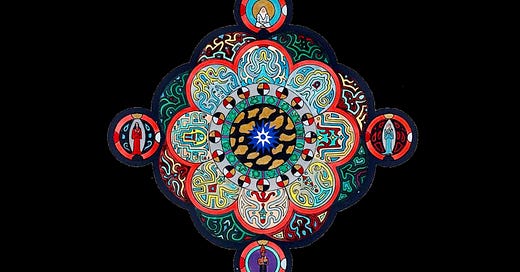Read The Structures of Consciousness for a general introduction to personality type theory.
Encountering Personality Type
Long before I had heard of Jungian Typology or taken an online MBTI test, a friend curiously inquired what everyone’s personality type is. A close group of my friends and I had just finished up a trip to Yosemite National Park. Although we had known each other for years, some of us as far back as high school and middle school, we found the trip to be a powerful bonding experience. To further dive into understanding one another, we each took the test and shared results. Interestingly, the group seemed to cluster around similar cognitive functions, intuition (N) and feeling (F), with the most common personality type being INFP.
I scored as an ENFJ, someone who leads with extraverted feeling (Fe). In general, the feeling function focuses on evaluating and maintaining needs, desires and worth. Personal, cultural, or societal values are the starting point for decision-making, rather than logical principles, which thinking prioritizes. There are two different types of feeling, introverted feeling (Fi) and extraverted feeling. Each person uses only one of these in their main cognitive style. If an individual’s feeling function is introverted, it orients inwards to personal criteria of needs, emotions, and feeling-toned impressions. If the feeling function is extraverted it naturally suppresses the personal factor in favor of the outer world:
Since Fe types focus on external sources of feeling, they are naturally more attuned to the feelings of others than their own. This has several implications: they primarily treat their feelings as objective evaluations of the world, they monitor people’s emotions, they monitor changes in the social atmosphere, they do more to adapt to social cues, and they are more motivated to change or resolve negative social environments.
This style of feeling resonates to what drives and motivates me. I am people-oriented and focus on the signals I receive from the external world. The nature of the work I do (client-based, helping profession) reflects that. I often approach life with an empathetic nature, have a deep care and concern for the group, and desire to remedy tension in social situations. I also struggle to put my needs first, I will readily sacrifice my own desires or not even voice them in favor of the what is best for the group or another. I am also easily wounded by criticism, feel sensitive to bothering or hurting others, and can tell that my self-image has often been dictated by the judgements and impressions of people I am close to.
Many of my friends have affirmed my extraverted feeling nature. Once when I made a comment that I was actually quite introverted, a friend reacted in surprise and questioned if that was so. This exchange was important because it demonstrated how your extraverted function is what people can most readily detect, because it is oriented outwards. If you lead with an introverted function, especially if it is the more subtle perceiving functions of intuition or sensation, you may be mistyped as an extravert.
Furthermore, I have a loose hypothesis that individuals with a high ranking extraverted judging function (thinking or feeling in the dominant or auxiliary placement) in their personality stack will often come across as more stereotypically extraverted because they have an impulse to attune, order and evaluate their surroundings.

Questioning Test Results
With little knowledge of how this system of personality type actually worked, I went on thinking my type was ENFJ. That was until I became more interested in the theory and read Jung’s Psychological Types. Through more nuanced understanding of cognitive functions and further self-tests, I began to explore INFJ as my type. The differences of these two is subtle, but important.

As you can see, the functions are the same, but in a different order. INFJ’s lead with introverted intuition (Ni) and use extraverted feeling in an auxiliary, supportive role. Think of the personality stack as a hierarchy of cognitive tools. The highest functions are the most differentiated, relied upon and influential. The top function is the leader of the pack, often the root of identity, and first develops early in childhood. Thus, some useful questions to consider are “What were you like as a child? What motivated you? What seemed to drive your behavior?”
With this in mind, I realized that I had been ignoring the biggest part of my personality in favor of the obvious feeling function that others can recognize. Suddenly, it was rather obvious that intuition has always been the dominant aspect of my psyche; so fundamental and constant that I didn’t think to question its presence. As a child I was deeply imaginative, often feeling like I existed or could tap into another world. I was known for being clumsy, shutting out the concrete world as I was lost in day dreams (a product of dominant intuition with inferior sensate awareness). Despite hardships in my childhood, I felt there was something that drove me forward, a development of my being that I was absolutely committed to and could vaguely sense in a mysterious way.
Introverted intuition perceives the world through a lens of potential, purpose and meaning. Perception flows from an unconscious, inward space generating a kind of “knowing without knowing”. Thus, the introverted intuitive is likely to sense and trust “gut feelings”, have flashes of insight without knowing what triggered it, and follow inner images and symbols with faith and trust.
Ni focuses on perceiving underlying patterns and creating meaning through symbolic intuition; it observes facts/events from various perspectives in order to construct a bigger pattern that can be used for predicting future outcomes.
Being introverted, the function of intuition builds a deep and steadfast inner system of abstract connections and grand patterns. It orients towards what could be with a laser focus, with such an assurance of these visions that it can be hard to let go. A meaningful higher purpose, for themselves and others, seems to be the driving force with introverted intuition. This can also lead to an overly idealistic attitude, perfectionism and unrelenting intensity that alienates others.
Deepening Self-Understanding
From exploring the subtlety of the INFJ and ENFJ personality type, I came to a few realizations:
A mix of self-awareness and external feedback is important to gather a well-rounded insight of your type.
The function you lead with reveals a lot about your conscious orientation, but even more about your blindspots and where you are weakest.
Types with a small difference (like the switch between the 1st and 2nd function) actually manifest quite differently as they prioritize the world in oppositional ways (i.e, introverted vs extraverted).
The label, ultimately, is not that important. But it gives you a clue to the functions in the stack and how the architecture of your consciousness is influenced by them.
I have come to a place in my journey where I feel rather confident in categorizing myself as an INFJ. It affirms that each function has always been in service to the great powers of my intuition, which without doubt has always been my guiding star. Important choices in my life have been weighed against the patterns of potential I sense, if it aligns with my symbolic visions, I move forward with a sense of unwavering certainty. I also easily discard or don’t entertain possibilities if they seem out of alignment. To me, the environment, people, and my own inner aspects hold a magical quality of possibility. I tap into these invisible threads without realizing it, like a clairvoyant vision I see images in my mind and create connections that allow me to see potential and envision ways to get there.
Dominant functions can also become quite tyrannical as they are prone to heroic inflation, attacking issues with the most differentiated weapon in the psychic tool kit and stubbornly denying other points of view. This is a great source for self-reflection:
How does my intuition struggle to release its grip of control?
What are the consequences of willfully digging my feet into the sand when something is counter to my visions?
How can I learn to hold my intuitive insights more lightly and allow other aspects of my personality to step in?
I also see how my less mature Fe function tries to balance the delicate nature of other people’s emotions and needs against the potential I see for them in life. This has caused conflict at times, for the desire to show others the vision of what could be (Ni drive) and assist them with their problems (Fe drive) can threaten their own sense of self, comfort or harmony. To others, it can feel like an overstepping of boundaries that causes tension in the relationship, a particularly painful outcome for Fe individuals.
Personality theory has helped me put my strengths and weaknesses into context. It has raised my awareness of why I do what I do, and more importantly, the psychological energy that is flowing behind those actions. If we are to walk the path of individuation more consciously then we can use psychological type as a loose map and compass that illuminates the often difficult to apprehend nature of the psyche.





I recently read "Please understand me" and found the idea of temperaments really useful - maybe more so for thinking about others than myself. ENFJ and INFJ would both fall into the 'Apollonian' temperament.